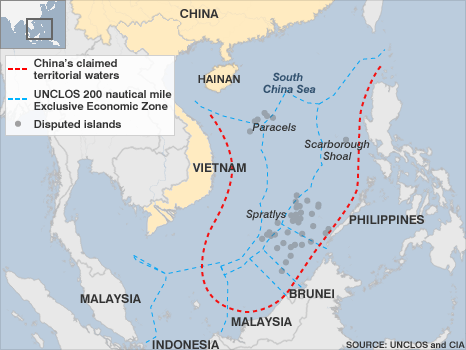Headline
Philippines says ASEAN’s credibility at stake over China’s reclamation of disputed reefs
MANILA, Philippines—The Philippines has urged fellow Southeast Asian nations to demand that China immediately stop its land reclamation in contested South China Sea reefs, warning the 10-nation bloc’s credibility may be undermined if it remains silent on the issue.
Foreign Secretary Albert del Rosario told Association of Southeast Asian Nations ministers that China’s massive reclamations, which all appear “to be near completion as portrayed by available photos,” could threaten freedom of navigation and the region’s biodiversity.
China’s neighbours are also concerned that the reclaimed areas, which now are Chinese-controlled territories farthest from its mainland, could be used by Beijing as offshore military bases and resupply and refuelling hubs to reinforce its territorial claims.
“ASEAN cannot remain silent on these serious developments,” Del Rosario told the bloc’s top diplomats in a meeting Wednesday in Malaysia’s Kota Kinabalu city. “To do so, would be a grave mistake with fundamental strategic consequences.
”
The Philippines, Vietnam and Malaysia have protested the land reclamations, which have transformed Johnson South Reef and other underwater coral outcrops in the Spratly archipelago into virtual islands.
U.S. officials have also expressed concern over China’s activities.
According to del Rosario, “inaction on this would undermine the principle of centrality, since we are unable to address in a collective and unified manner such a critical issue in our own backyard.
” A copy of his speech was obtained by The Associated Press on Thursday.
The Chinese Embassy in Manila had no immediate comment, but Beijing’s foreign ministry has said that the area where the reclamation is reportedly underway is part of China’s territory, and that any Chinese activities there should be of no concern to the Philippines and other countries.
Brunei and Taiwan also claim parts of the sprawling sea, which has some of the world’s busiest commercial sea lanes.
Del Rosario said the land reclamations appeared to be a part of the “step by step realization of China’s illegal nine-dash line,” referring to a rough demarcation of China’s territory on its official maps that virtually envelopes most of the South China Sea, including areas that other Southeast Asian nations also claim.
“With both freedom of navigation, peace and stability at risk, ASEAN as a regional force should consider reaching out to the community of nations to help us say to China that what it is doing is wrong, that it must immediately stop its reclamation activities,” he said.






















